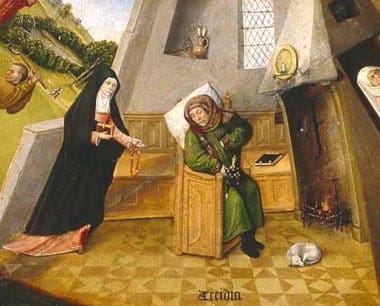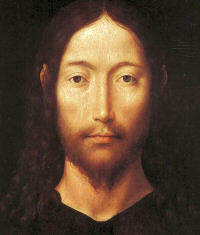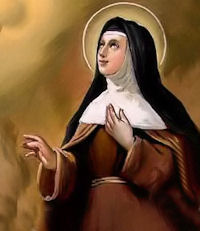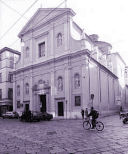On the Malice of Mortal Sin
March 6, 2015 by Dan Burke
ON THE MALICE OF MORTAL SIN
“I have brought up children and exalted them; but they have despised me.”
cf Isaiah 1:2
What does the sinner do when he commits mortal sin? He insults God, he dishonors him, he afflicts him. In the first place, mortal sin is an insult offered to God. The malice of an insult is, as St. Thomas says, estimated from the condition of the person who receives and of the person who offers the insult. It is sinful to offend a peasant; it is more criminal to insult a nobleman: but to treat a monarch with contempt and insolence, is a still greater crime. Who is God? “He is Lord of lords and king of kings” (Revelation 17:14). He is a Being of infinite majesty, before whom all the princes of the earth, and all the saints and angels, are less than an atom of sand. “As a drop of a bucket…as a little dust” (Isaiah 40:15). The prophet Hosea adds, that, compared with the greatness of God, all creatures are as insignificant as if they did not exist. “All nations,” [Isaiah] says, “are before him as if they had no being at all” (cf Isaiah 40:17). Such is God; and what is man? He is, according to St. Bernard, a heap of worms, the food of worms, by which he shall be soon devoured. “Saccus vermium, cibus vermium.” He is “miserable, and poor, and blind, and naked” (Revelation 3:17). Man is a miserable worm, that can do nothing; he is so blind that he knows nothing, and so poor and naked that he possesses nothing. And this miserable worm voluntarily insults a God! “Vile dust,” says the same St. Bernard, “dares to provoke such tremendous majesty.” The angelic doctor, then, had just reason to say that the sin of man contains, as it were, an infinite malice. “Peccatum habet quandam infinitatem malitiae ex infinitate divinae majestatis” (P. 3, q. 2, c. 2, ad. 2.). And St. Augustine calls sin “an infinite evil.” Hence, were all men and angels to offer themselves to death and annihilation, the oblation should not satisfy for a single sin. God punishes sin with the pains of hell; but all theologians teach that this chastisement is less than sin deserves.
And what punishment can be sufficient for a worm who assails his Lord? God is the Lord of all, because he has created all. “All things are in thy power. . . . Thou hast made heaven, and earth, and all things” (Esther 13:9, 10 [Esther 4:C:1, 2 NAB]). All creatures obey God, “The winds,” says St. Matthew, “and the sea obey him” (Matthew 8:27). “Fire, hail, snow, ice, stormy winds, which fulfill his will” (cf Psalm 148:8). But when man sins, what does he do? He says to God, Lord, I will not serve thee. “Thou hast broken my yoke; thou hast burst my bonds; thou saidst, I will not serve” (Jeremiah 2:20). The Lord says to him, Seek not revenge; take not that property which belongs to another; abstain from that unchaste gratification. But man answers, I will have revenge; I will take possession of that property; I will indulge in that forbidden pleasure. Like Pharaoh, when Moses, on the part of God, commanded him to allow the people to go into the desert, the sinner answers, “Who is the Lord, that I should hear his voice, and let Israel go?” (Exodus 5:2). The sinner says the same–Lord, I know you not; I will do what I please. In a word, he insults the Lord to his face, and turns his back upon him. Mortal sin is precisely a turning away–from God. “Aversio ab incommutabili bono” (St. Thomas, Summa Theologica, Part I of Part II, q 24, art 4). Of this the Lord himself complains–“Thou hast forsaken me, saith the Lord thou art gone backward” (cf Jeremiah 15:6). You have, says God, been ungrateful to me; you have abandoned me; you have turned your back upon me; you “are gone backward.” God has declared that he hates sin. Hence he cannot but hate the sinner who commits it. “But to God the wicked and his wickedness are hateful alike” (Wisdom 14:9). In committing sin, man dares to declare himself the enemy of God, and to contend single-handed with the Lord. “He hath,” says Job, “strengthened himself against the Almighty” (cf Job 15:25). What would you say if you saw an insect attack an armed soldier? God is the Omnipotent Being who by a nod has “created heaven and earth out of nothing” (cf 2 Maccabees 7:28). And if he wish, he can, by another act of his will, destroy all creatures. “The Almighty Lord, who, at a beck, can utterly destroy…the whole world” (cf 2 Maccabees 8:18). In consenting to sin, the sinner stretches out his hand against the Lord. “He hath,” says Job, “stretched out his hand against God. He hath run against him with his neck raised up, and is armed with a fat neck” (cf Job 15:26). He raises his neck, that is, he swells with pride, and runs to insult God; he arms himself with a fat neck, that is, with ignorance; for a fat neck is the symbol of ignorance, of that ignorance which makes the sinner say, What have I done? What great evil is that sin which I have committed? God is merciful–he pardons sinners. What an insult! What temerity! What blindness!
Affections and Prayers
Behold, O my God! At thy feet the rash and daring rebel, who has had the temerity and audacity to insult thee so often to thy very face, and to turn his back upon thee. Thou hast said, “Cry to me, and I will hear” (Jeremiah 33:3). Hell is too little for me; this I already know. But remember, O Lord, that I am more sorry for having offended thee, who art infinite goodness, than I would be for the loss of all my property and of my life. Ah, Lord, pardon me, and do not permit me ever to offend thee more. Thou hast waited for me that I may forever bless thy mercy and love thee. Yes, I bless thee, I love thee, and I hope, through the merits of Jesus Christ, that I shall never again be separated from thy love; thy love has rescued me from hell; it is by thy love that I am to be preserved from sin for the future. I thank thee, my Lord, for the light. and the desire thou dost give me to love thee forever. Ah! Take possession of my whole being–of my soul and body–of my powers and senses–of my will and liberty. “I am thine — save me.” Thou art my only good; thou art alone amiable; mayst thou also be my only love. Give me fervor in loving thee. I have offended thee grievously. Hence it is not enough for me to love thee; I wish to love thee ardently, in order to compensate the injuries I have done thee. From thee, who art omnipotent, I hope for this love. I also hope for it through thy prayers, O Mary, which art powerful before God.
Editor’s Note: This meditation is from St. Alphonsus Liguori’s “Preparation for Death” (1758).


 Born in 1380, Nicolette was named in honor of St. Nicholas of Myra. Her loving parents nicknamed her Colette from the time she was a baby. Colette's father was a carpenter at an abbey in Picardy. Quiet and hard-working, Colette was a big help to her mother with the housework. Her parents noticed the child's liking for prayer and her sensitive, loving nature.
Born in 1380, Nicolette was named in honor of St. Nicholas of Myra. Her loving parents nicknamed her Colette from the time she was a baby. Colette's father was a carpenter at an abbey in Picardy. Quiet and hard-working, Colette was a big help to her mother with the housework. Her parents noticed the child's liking for prayer and her sensitive, loving nature. 